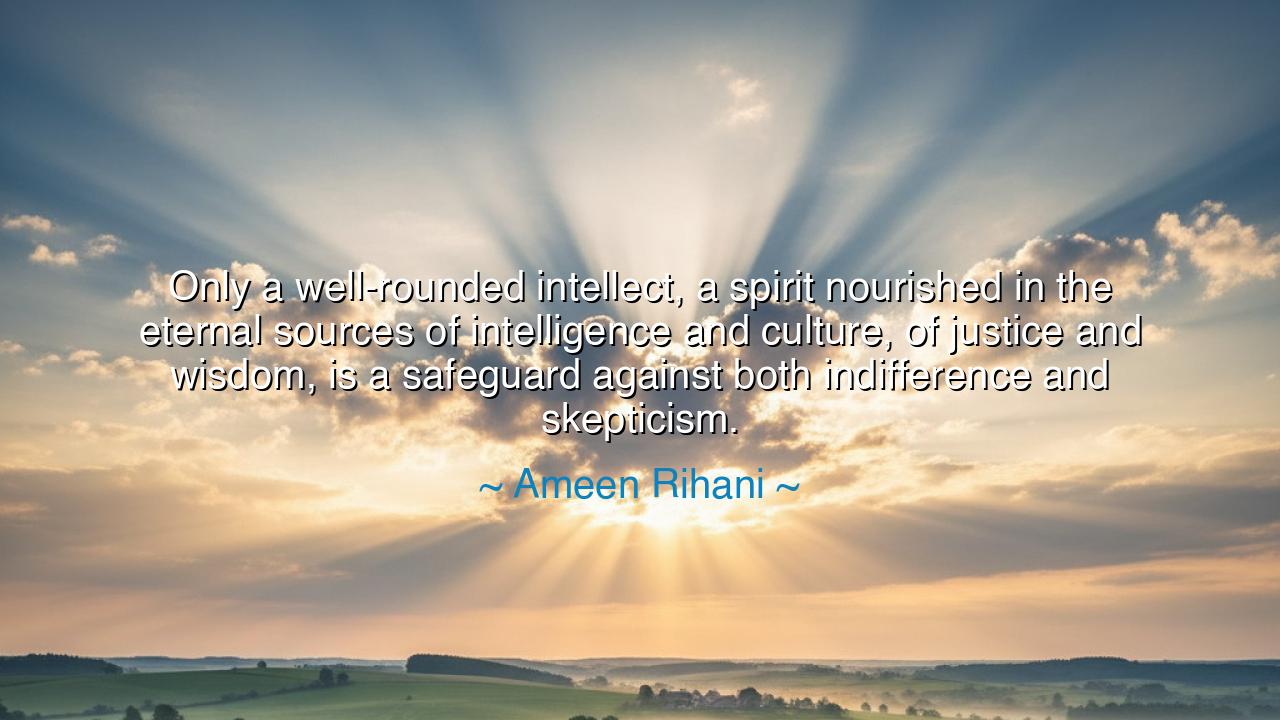
Only a well-rounded intellect, a spirit nourished in the eternal
Only a well-rounded intellect, a spirit nourished in the eternal sources of intelligence and culture, of justice and wisdom, is a safeguard against both indifference and skepticism.






The Fortress of the Enlightened Spirit
From the deep wells of wisdom, Ameen Rihani spoke with a voice that bridged East and West: “Only a well-rounded intellect, a spirit nourished in the eternal sources of intelligence and culture, of justice and wisdom, is a safeguard against both indifference and skepticism.” In these words lies the foundation of civilization itself—a call to awaken the intellect, to enrich the spirit, and to guard the heart against the twin poisons of apathy and disbelief. For Rihani, who walked among the deserts of Arabia and the cities of America, this truth was no abstraction; it was the living lesson of a man who saw the human soul torn between knowledge and emptiness, progress and moral decay.
The meaning of his words runs deep. A well-rounded intellect is not merely one that knows facts or collects learning; it is a mind balanced by culture, tempered by justice, and crowned with wisdom. It is not enough to be clever—one must be complete. Knowledge alone can sharpen the blade of pride, but when the intellect is nourished by eternal sources—the truths that do not fade with time—it becomes a guardian of humanity. Such a spirit cannot fall prey to indifference, for it feels the suffering of others as its own; nor can it sink into skepticism, for it sees meaning even amidst the chaos of the world.
Rihani, born of Lebanon’s mountains and matured among the modern thinkers of the West, understood the peril of one-sided knowledge. He saw that societies rich in science but poor in soul become hollow, and that nations without justice and wisdom crumble from within. To him, the true education of the human being must unite both the mind and the moral spirit, reason and compassion, the art of thought and the art of goodness. The ancients of Greece called this paideia—the cultivation of the whole person; the sages of Arabia called it adab—the refinement of character and intellect together. Rihani, heir to both traditions, proclaimed their unity for a modern age drowning in cleverness but starving for wisdom.
Consider the story of Marcus Aurelius, emperor and philosopher of Rome. Surrounded by war, deceit, and the temptations of absolute power, he turned not to conquest for meaning but to philosophy—to the inner education of the soul. His Meditations were not words of ambition, but prayers for balance: to remain just amid corruption, wise amid chaos, compassionate amid cruelty. He embodied Rihani’s ideal—the well-rounded intellect guided by moral strength. And because he cultivated both understanding and virtue, he ruled without arrogance and died without despair. His example shines still as proof that intelligence without justice is dangerous, but justice without intelligence is blind.
Rihani warns us that when the spirit is not nourished by eternal truths, it withers into indifference—a numbness to beauty, to injustice, to life itself. And when the intellect loses faith in meaning, it decays into skepticism—a denial of goodness, a scorn for hope. These are the diseases of our age: minds flooded with information yet barren of insight, souls busy but unawakened. The antidote lies in returning to the sources—the eternal fountains of art, philosophy, faith, and nature—where humanity first learned to wonder. There, the heart rediscovers reverence, and the mind rediscovers purpose.
This quote, therefore, is both a warning and a prescription. It tells us that civilization cannot survive on science and commerce alone. It must be rooted in the invisible virtues—intelligence that seeks truth, culture that uplifts, justice that protects, and wisdom that guides. Each human being must become a microcosm of this harmony: the thinker who also feels, the dreamer who also acts, the believer who also questions. Such souls become the safeguards of humanity, the living fortresses against the cynicism and apathy that corrode the modern world.
So let this be your charge, O seeker of wisdom: Feed your mind, but also your heart. Read the words of the poets, the sages, and the prophets; listen to the silence of nature and the cry of the oppressed. Seek understanding not for power, but for service. Balance your intellect with empathy, your ambition with virtue, your reason with reverence. For only the spirit so nourished can remain steadfast when the world grows cold and faith seems faint. And when your own heart begins to waver, return again to the eternal sources—to truth, to justice, to beauty—for there the fountains of wisdom never run dry.
Then you will stand as Rihani envisioned: a being complete and awake, neither indifferent nor skeptical, but alive with understanding and radiant with purpose—proof that the union of intelligence and virtue is still the greatest power beneath the sun.






AAdministratorAdministrator
Welcome, honored guests. Please leave a comment, we will respond soon